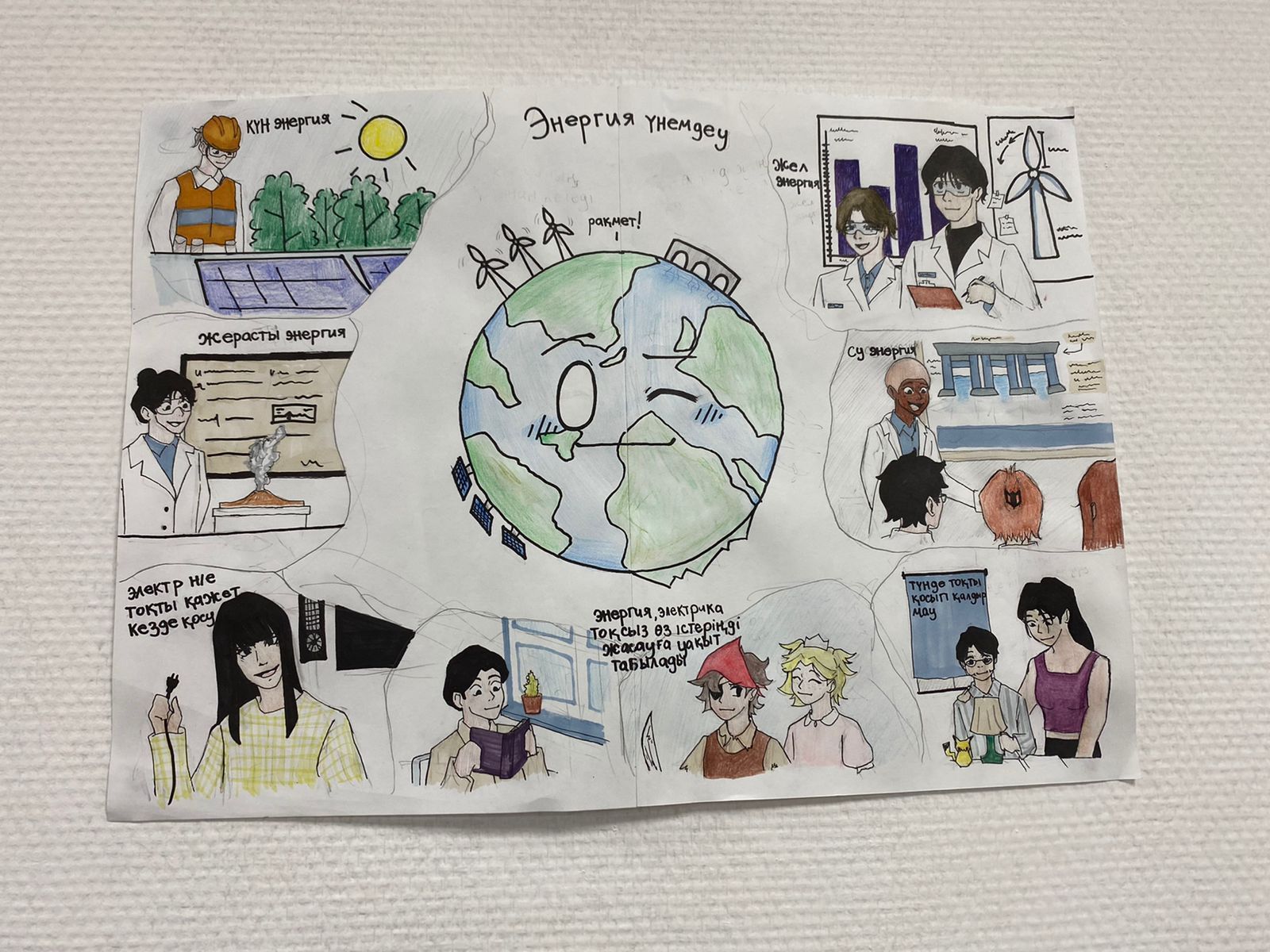@OUSSAfd6aa665af
In my opinion a project on recycling or renewable energy will be a good motivational project for all your students, especially if it is based on ecological nettles and visits to certain regional premises.*
Good Luck
@OUSSAfd6aa665af
In my opinion a project on recycling or renewable energy will be a good motivational project for all your students, especially if it is based on ecological nettles and visits to certain regional premises.*
Good Luck
"Empowering students through engaging education, fostering environmental consciousness, and advancing scientific literacy. Committed to shaping future leaders in Life and Earth Sciences."
In my opinion a project on recycling or renewable energy will be a good motivational project for all your students, especially if it is based on ecological nettles and visits to certain regional premises.
"Empowering students through engaging education, fostering environmental consciousness, and advancing scientific literacy. Committed to shaping future leaders in Life and Earth Sciences."
Absolutely! Promoting sustainability is vital for our planet's future. Here are some ideas to take that "One Small Step" toward a more sustainable lifestyle:
Reduce, Reuse, Recycle: Start with the basics. Encourage people to adopt the habit of recycling paper, plastic, glass, and metal. Also, promote the idea of reusing items instead of throwing them away.
Composting: Encourage composting of organic waste. It reduces methane emissions from landfills and provides nutrient-rich soil for gardens.
"Empowering students through engaging education, fostering environmental consciousness, and advancing scientific literacy. Committed to shaping future leaders in Life and Earth Sciences."
Ther is some solution:
Go Vegan/Vegetarian Once a Week: Meat production has a significant environmental impact. Encourage people to reduce their meat consumption by going vegan or vegetarian for one day a week.
Use Renewable Energy: Invest in solar panels or wind turbines for your home. If not possible, consider purchasing renewable energy from your utility company.
"Empowering students through engaging education, fostering environmental consciousness, and advancing scientific literacy. Committed to shaping future leaders in Life and Earth Sciences."
There is some ideas:
Support Local Farmers and Businesses: Buy locally produced goods to reduce carbon emissions associated with transportation. Additionally, support businesses that prioritize sustainability.
Reduce Water Waste: Encourage water-saving practices such as fixing leaks, using low-flow fixtures, and collecting rainwater for outdoor use.
"Empowering students through engaging education, fostering environmental consciousness, and advancing scientific literacy. Committed to shaping future leaders in Life and Earth Sciences."
@There are some ideas:
Ditch Single-Use Plastics: Say no to single-use plastics like straws, bags, and water bottles. Opt for reusable alternatives such as stainless steel water bottles and cloth shopping bags.
Plant Trees: Trees absorb carbon dioxide and provide oxygen. Organize tree-planting events in your community or participate in existing initiatives.
Promote Public Transportation and Cycling: Encourage people to use public transportation, carpool, or bike instead of driving alone. It reduces traffic congestion and carbon emissions.
Educate and Advocate: Spread awareness about sustainability through workshops, seminars, or social media campaigns. Advocate for policies that support renewable energy, conservation, and environmental protection.
Remember, even small actions can make a big difference when it comes to sustainability. It's about collective effort and making conscious choices in our daily lives.
"Empowering students through engaging education, fostering environmental consciousness, and advancing scientific literacy. Committed to shaping future leaders in Life and Earth Sciences."
The recycling of materials as well as the search for a new energy resource remains at the moment the only means to save our future generations
The recycling of materials as well as the search for a new energy resource remains at the moment the only means to save our future generations
The recycling of materials as well as the search for a new energy resource remains at the moment the only means to save our future generations
To secure a sustainable future for generations to come, it's imperative to prioritize both the recycling of materials and the quest for innovative energy sources. Recycling stands as a cornerstone in our efforts to mitigate environmental degradation by reducing waste and conserving resources. Implementing comprehensive recycling programs, incentivizing responsible consumption, and investing in advanced recycling technologies can significantly alleviate the strain on our ecosystems. Concurrently, diversifying our energy portfolio is paramount. Exploring renewable sources such as solar, wind, hydro, and geothermal power not only reduces reliance on finite fossil fuels but also mitigates greenhouse gas emissions, curbing climate change. Embracing energy-efficient practices, incentivizing clean energy initiatives, and fostering international collaboration are pivotal steps towards safeguarding the prosperity of future generations. By embracing these solutions, we pave the way for a more sustainable and resilient world, ensuring a legacy of abundance rather than scarcity for those who will inherit the planet after us.
In addition to recycling materials and transitioning to renewable energy sources, another critical solution lies in embracing circular economy principles. Unlike the traditional linear economy of "take-make-dispose," a circular economy aims to minimize waste and maximize the use of resources by promoting reuse, repair, remanufacturing, and recycling. By designing products with longevity and recyclability in mind, businesses can reduce their environmental footprint while fostering economic growth. Encouraging consumers to choose durable, repairable goods and supporting initiatives that facilitate product refurbishment and resale can further enhance the circular economy's impact. Additionally, promoting sustainable production practices, such as eco-friendly packaging and responsible sourcing of raw materials, can help close the loop on resource consumption. Embracing a circular economy not only conserves resources but also fosters innovation, creates jobs, and builds resilience in the face of global challenges.
Dear partners, your sharings are are great. i've read in deep learning by M.Fullan that "teachers need a broad multidimensional knowledge that allows them both to assess situations quickly and to draw upon a variety of repertoires for intervention. Individual teachers possess such knowledge, but it is largely invisible to the field as a whole". Indeed, individually ready-to-grow teachers in their endeavours to share knowledge creation provide compelling learning experience.
Let me share with an image as well
One of SDGs, depicted by my daughter.jpeg

since I am a life and earth sciences teacher, we often organize ecological outings with our students, some of the parents accompany their children with us (of course with their own means of transport (, therefore our team of 'in teachers and regional management), take this opportunity to share our objectives with them and thus expand our cooperation with them, moreover I teach in a small community called Jendouba (Northern Tunisia) where the majority residents know each other
"Empowering students through engaging education, fostering environmental consciousness, and advancing scientific literacy. Committed to shaping future leaders in Life and Earth Sciences."
Transportation alternatives in Puerto Rico face significant challenges due to a combination of infrastructure issues, limited public transit options, and geographic constraints. The island's public transportation system is underdeveloped, with infrequent and unreliable bus services that do not adequately cover rural or suburban areas. Additionally, the Tren Urbano, a single-line metro system, only serves a small portion of the population in the San Juan metropolitan area.
The mountainous terrain and dispersed population make expanding public transit infrastructure costly and logistically complex. Furthermore, the high reliance on personal vehicles leads to severe traffic congestion, particularly in urban centers. The lack of comprehensive and efficient transportation alternatives not only hampers daily commutes but also limits economic opportunities and access to essential services for many residents.
I think we need to expand and enhance ferry services to connect coastal and island communities, reducing the reliance on road travel and providing efficient alternatives for intercity and inter-island transportation. This could be amazing.
Thank you dear coleague
"Empowering students through engaging education, fostering environmental consciousness, and advancing scientific literacy. Committed to shaping future leaders in Life and Earth Sciences."
"Strive for Sustainability: Every Step Counts!"
"Small Changes, Big Impact: Let's Step Towards Sustainability!"
"Taking One Step Closer to a Greener Future!"
"Progress, Not Perfection: Every Step Towards Sustainability Matters!"
"One Foot Forward, Towards a Sustainable Tomorrow!"
"Step Up for Sustainability: Let's Walk the Talk!"
"Embrace the Journey: Step by Step Towards a Sustainable World!"
"From Little Steps to Giant Leaps: Building a Sustainable Future!"
"Walk Towards Sustainability: One Step at a Time!"
"Step Into Sustainability: Each Move Makes a Difference!"

Continuous improvement is crucial for advancing sustainability efforts. From reducing waste to conserving resources and implementing eco-friendly practices, every small step plays a part in creating a significant positive impact on the environment. By adopting a mentality of ongoing enhancement, we ensure that we are constantly working towards better solutions and actively contributing to the promotion of sustainability for our planet and the well-being of future generations.
Hi Antonia,
Hope everything is going well. Thank you for emphasizing the importance of continuous improvement in sustainability efforts. I completely agree that every small step, from reducing waste to conserving resources and adopting eco-friendly practices, contributes significantly to positive environmental impact. I'm a big fan of being an eternal student to be a great teacher.
By fostering a mindset of ongoing enhancement, we can continually strive for better solutions and make meaningful contributions to sustainability. A mindset to create in our students. We are their role models. This approach not only benefits our planet but also ensures the well-being of future generations. It's inspiring to see a collective commitment to making a lasting difference.
Best,
Mr. Bryan
@MERIA2fb03b24d1
very interesting
Thank you Meriam
"Empowering students through engaging education, fostering environmental consciousness, and advancing scientific literacy. Committed to shaping future leaders in Life and Earth Sciences."
Recycling materials and exploring alternative energy sources stand as crucial pillars in safeguarding the future for generations to come. Through recycling, we mitigate the strain on natural resources, curbing the depletion of finite materials while minimizing waste and pollution. This sustainable approach not only conserves precious resources but also reduces the environmental impact of manufacturing processes. Moreover, the quest for new energy resources offers a lifeline amidst the looming threat of climate change. By investing in renewable energy sources like solar, wind, and hydroelectric power, we can transition away from fossil fuels, mitigating greenhouse gas emissions and combating climate change. Embracing these practices isn't just an environmental choice; it's a moral imperative to secure a livable planet for our descendants.